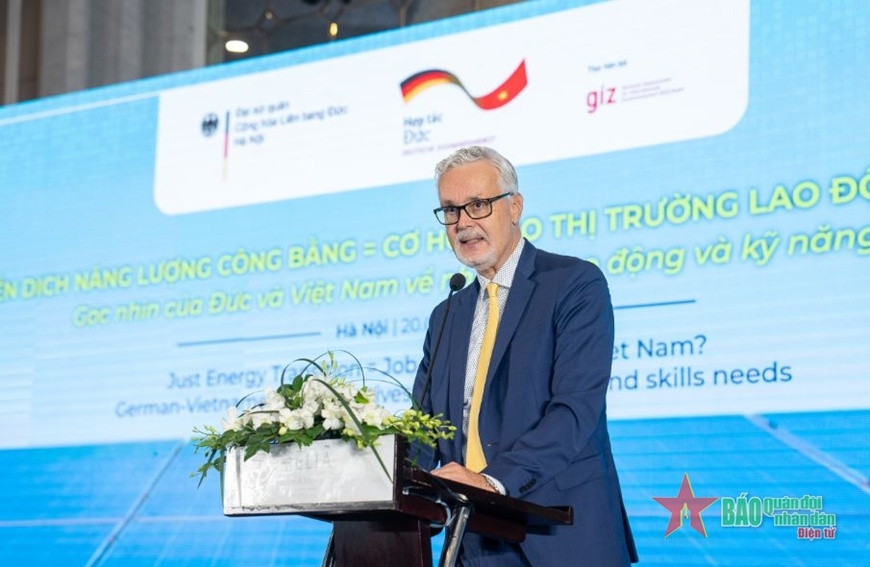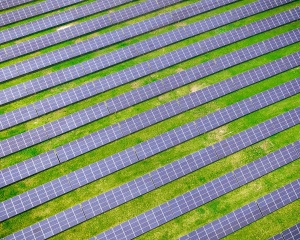Vietnam eyes green jobs amidst energy transition: Insights from German experience
 |
The German Embassy in Vietnam hosted a pivotal seminar on September 20 on the just energy transition and opportunities in Vietnam's labour market. The discussion centred on the potential for green jobs in the wake of Vietnam's evolving energy landscape.
Speaking at the event, German Ambassador to Vietnam Dr. Guido Hildner drew attention to the nation's ambitious goal of achieving carbon neutrality by 2050. Coupled with its commitment to a just energy transition, this opens vast opportunities for sustainable development and promises a robust influx of high-quality job opportunities for the future.
Reflecting on his home country's experience, Ambassador Hildner stated, "In Germany, the number of employees working in skilled green sectors saw a surge of 56.7 per cent, rising to 5 million between 2012 and 2020. This underscores that while the energy transition is a complex and demanding journey, it has immense potential to benefit citizens and the economy at large."
Recent policies from the Vietnamese government have spurned considerable growth in the renewable energy sector, which boasts impressive figures. According to the National Power Development Plan VIII, by 2045, over 75 per cent of the nation's energy will be sourced renewably.
Current studies also highlight that in sectors like wind and solar energy, nearly a quarter of jobs generated are earmarked for highly skilled personnel. The push for a skilled workforce in the industry is only expected to grow in Vietnam over the next decade.
Such projections mean that training institutions need to adapt to this changing landscape promptly to equip the workforce to meet the country's domestic requirements.
Ta Dinh Thi, deputy head of the National Assembly's Committee on Science, Technology, and Environment, reaffirmed that the energy transition is an inevitable trajectory towards sustainable energy development.
"To ensure a successful energy transition, the shift towards green jobs in renewable sectors is paramount," he noted.
He further stressed the urgency to proactively strategise and plan for the training and implementation of a high-quality workforce in the green energy sector.
“This involves tapping into the strengths of the current workforce while harnessing advanced scientific and technological achievements and new skills that are relevant to the energy transition,” Thi concluded.
 | Norway and Vietnam collaborate on energy transition The participation of the private sector is seen as an important aspect of implementing Power Development Plan VIII and promoting Vietnam's goal of transitioning from fossil fuels to clean and renewable energy sources. |
 | Energy China eyes expansion in Vietnam with increased investment in renewable projects Energy China, a Fortune 500 energy conglomerate, has unveiled plans to expand its investments in Vietnam. |
 | Electricity prices must reflect production costs for green transition Nguyen Xuan Thanh, a lecturer at the Fulbright School of Public Policy and Management in Vietnam, has suggested that for a successful green transition, Vietnam must accurately adjust electricity prices to mirror the costs of renewable energy production. |
What the stars mean:
★ Poor ★ ★ Promising ★★★ Good ★★★★ Very good ★★★★★ Exceptional
Related Contents
Latest News
More News
- Vingroup consults on carbon credits for electric vehicle charging network (January 28, 2026 | 11:04)
- Bac Ai Pumped Storage Hydropower Plant to enter peak construction phase (January 27, 2026 | 08:00)
- ASEAN could scale up sustainable aviation fuel by 2050 (January 24, 2026 | 10:19)
- 64,000 hectares of sea allocated for offshore wind surveys (January 22, 2026 | 20:23)
- EVN secures financing for Quang Trach II LNG power plant (January 17, 2026 | 15:55)
- PC1 teams up with DENZAI on regional wind projects (January 16, 2026 | 21:18)
- Innovation and ESG practices drive green transition in the digital era (January 16, 2026 | 16:51)
- Bac Ai hydropower works stay on track despite holiday period (January 16, 2026 | 16:19)
- Fugro extends MoU with PTSC G&S to support offshore wind growth (January 14, 2026 | 15:59)
- Pacifico Energy starts commercial operations at Sunpro Wind Farm in Mekong Delta (January 12, 2026 | 14:01)

 Tag:
Tag:




















 Mobile Version
Mobile Version